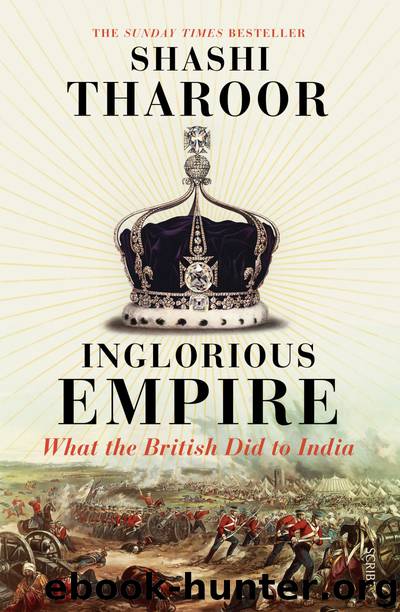Inglorious Empire by Shashi Tharoor

Author:Shashi Tharoor
Language: eng
Format: epub, azw3
Tags: POL045000, HIS017000, HIS015000, HIS037060
Publisher: Scribe Publications
Published: 2017-07-31T04:00:00+00:00
5
THE MYTH OF ENLIGHTENED DESPOTISM
There has been a tendency on the part of many, including several Anglophile Indians, to see British colonial rule as essentially benign, a version of the ‘enlightened despotism’ that characterized the Enlightenment of the eighteenth and nineteenth centuries. In this view, the British may have been imperialists who denied Indians democracy, but they ruled generously and wisely, for the greater good of their subjects. To paraphrase Emperor Joseph II of Austria, who famously said: ‘Everything for the people, nothing by the people’, the British, in this reading, may not have let the Indians do anything, but they did everything for them.
This view is either naïve or self-serving, it is difficult to decide which. A few examples of how the British actually ruled in India are therefore worth examining, for they give the lie to this narrative. The most obvious example relates to the famines the British caused and mismanaged; to the system of forced emigration of Indians by transportation and indentured labour; and to the brutality with which dissent was suppressed. We shall examine each of these briefly.
Feast and Famine: The British and ‘Starving India’
As India became increasingly crucial to British prosperity, millions of Indians died completely unnecessary deaths in famines. As a result of what one can only call the British Colonial Holocaust, thanks to economic policies ruthlessly enforced by Britain, between 30 and 35 million Indians needlessly died of starvation during the Raj. Millions of tonnes of wheat were exported from India to Britain even as famine raged. When relief camps were set up, the inhabitants were barely fed and nearly all died.
It is striking that the last large-scale famine to take place in India was under British rule; none has taken place since, because Indian democracy has been more responsive to the needs of drought-affected and poverty-stricken Indians than the British rulers ever were. As the scholar and Nobel Laureate Amartya Sen has explained, there has never been a famine in a democracy with a free press, because public accountability ensures effective response. Sen’s work, informed by compassion as well as solid quantitative research, has established the now widely-accepted doctrine that famines are nearly always avoidable; that they result not from lack of food but lack of access to food; that distribution is therefore the key, and that democracy is the one system of government that enables food to be distributed widely and fairly. Lack of democracy and public accountability, however, is what characterized British rule in India.
A list of major famines during British rule makes for grim reading: the Great Bengal Famine (1770), Madras (1782–83), Chalisa Famine (1783–84) in Delhi and the adjoining areas, Doji bara Famine (1791–92) around Hyderabad, Agra Famine (1837–38), Orissa Famine (1866), Bihar Famine (1873–74), Southern India Famine (1876–77), the Indian Famine (1896–1900 approx.), Bombay Famine (1905–06) and the most notorious of the lot, the Bengal Famine (1943–44).10 The fatality figures are horrifying: from 1770 to 1900, 25 million Indians are estimated to have died in famines, including 15 million in the five famines in the second half of the nineteenth century.
Download
This site does not store any files on its server. We only index and link to content provided by other sites. Please contact the content providers to delete copyright contents if any and email us, we'll remove relevant links or contents immediately.
| Africa | Americas |
| Arctic & Antarctica | Asia |
| Australia & Oceania | Europe |
| Middle East | Russia |
| United States | World |
| Ancient Civilizations | Military |
| Historical Study & Educational Resources |
The Rape of Nanking by Iris Chang(3507)
The Sympathizer by Viet Thanh Nguyen(3461)
World without end by Ken Follett(3003)
Ants Among Elephants by Sujatha Gidla(2920)
Blood and Sand by Alex Von Tunzelmann(2605)
Japanese Design by Patricia J. Graham(2552)
City of Djinns: a year in Delhi by William Dalrymple(2129)
Inglorious Empire by Shashi Tharoor(2097)
Foreign Devils on the Silk Road: The Search for the Lost Treasures of Central Asia by Peter Hopkirk(2052)
In Order to Live: A North Korean Girl's Journey to Freedom by Yeonmi Park(2049)
Tokyo by Rob Goss(2014)
India's Ancient Past by R.S. Sharma(1982)
India's biggest cover-up by Dhar Anuj(1978)
The Great Game: On Secret Service in High Asia by Peter Hopkirk(1959)
Tokyo Geek's Guide: Manga, Anime, Gaming, Cosplay, Toys, Idols & More - The Ultimate Guide to Japan's Otaku Culture by Simone Gianni(1941)
Goodbye Madame Butterfly(1930)
The Queen of Nothing by Holly Black(1747)
Living Silence in Burma by Christina Fink(1726)
Batik by Rudolf Smend(1718)
